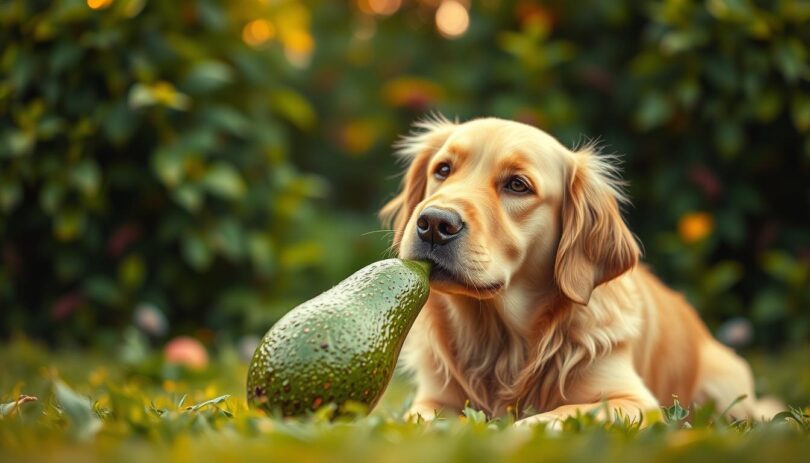As a pet owner, you might have wondered if sharing your avocado with your furry friend is a good idea. While avocados are a nutritious treat for humans, their impact on dogs is a topic of debate. Scientific studies and expert opinions offer insights into this matter, particularly focusing on a compound called persin, which can affect animals differently.
The safety of avocados for dogs varies depending on the part of the fruit. The flesh, skin, pit, and leaves each pose different risks. While the flesh contains healthy fats and vitamins, it also has persin, which can cause gastrointestinal upset. The skin and pit are even more dangerous, with higher concentrations of persin and the risk of obstruction.
This article will explore both the benefits and risks of feeding avocados to dogs. We’ll discuss the potential health benefits, such as improved skin and digestion, and the risks like pancreatitis and choking hazards. You’ll learn how to safely include avocados in your dog’s diet and discover alternative snacks that provide similar benefits without the risks. By the end of this article, you’ll be empowered with expert advice to make informed decisions about your dog’s nutrition.
What Makes Avocado Both Beneficial and Risky for Dogs
Avocados are a fascinating fruit that offers both nutritional value and potential risks for your furry friend. While they provide healthy fats and essential vitamins, they also contain a compound called persin, which can be harmful in large amounts. Understanding the balance between these aspects is crucial for pet owners.
Nutritional Benefits and Healthy Fats
The flesh of an avocado is rich in healthy fats, vitamins, and fiber, making it a nutrient-dense food. These nutrients can contribute to a shiny coat and healthy skin for your dog. Additionally, the fiber content may support improved digestion and reduce inflammation, which can be beneficial for your pet’s overall health.
Understanding Persin and Its Effects
Persin is a compound found in avocados, with higher concentrations in the skin, pit, and leaves. While dogs have some resistance to persin, consuming large amounts or the wrong parts of the avocado can lead to health issues. The flesh contains lower levels of persin but can still cause gastrointestinal upset if eaten in excess. It’s important to be cautious and aware of these risks when considering avocados as a food option for your dog.
The contrasting nature of avocados as both a nutrient-rich food and a potential health risk makes them a complex choice for pet owners. Striking the right balance between the benefits of nutrients and the risks associated with toxin exposure is key to safely including avocados in your dog’s diet.
Can Dogs Have Avocado? Examining the Evidence
Understanding whether avocados are safe for your pet involves looking at scientific research and expert opinions. While avocados offer nutritional benefits, they also pose certain risks that every pet owner should be aware of.
Scientific Insights and Expert Opinions
According to veterinarians, avocados contain a compound called persin, which is toxic to dogs in large amounts. The highest concentrations of persin are found in the skin, pit, and leaves of the avocado. Dr. Sandra C. Mitchell notes that while the flesh has lower levels of persin, it can still cause gastrointestinal upset if consumed in excess.
Research on Avocado Toxins and Digestive Reactions
Studies show that the pit of an avocado can be particularly dangerous, posing a choking hazard and potential intestinal blockage. The skin also contains higher levels of persin, which can lead to vomiting and diarrhea in dogs. Even small amounts of these parts can be harmful, making it crucial to only consider the flesh as a possible treat.
Veterinarians recommend consulting with a professional before introducing avocado to your dog’s diet. They can provide personalized advice based on your pet’s health and needs. Remember, while small amounts of avocado flesh might be safe, the pit, skin, and leaves should always be avoided.
Practical Tips for Safely Feeding Avocado to Your Dog
Feeding avocado to your dog can be a healthy treat if done correctly. However, it requires careful preparation and portion control to minimize risks.
Proper Preparation: Removing the Pit and Skin
Only the ripe flesh of the avocado is safe for your dog. The pit and skin contain high levels of persin, a toxin that can cause vomiting and diarrhea. Always remove these parts before serving.
The pit is also a choking hazard and can block your dog’s digestive tract. Keep avocados out of your dog’s reach to prevent accidents.
Portion Control and Gradual Introduction
Start with small amounts, like a few small pieces, and monitor your dog for any signs of discomfort. Even though avocados offer benefits like healthy fats and fiber, too much can lead to an upset stomach.
For more detailed advice, visit our guide on avocado safety for dogs.
Potential Health Risks When Including Avocado in Your Dog’s Diet
While avocados can offer nutritional benefits, they also carry risks that pet owners should understand. The high levels of fat in avocados, while healthy in moderation, can lead to serious health issues when overfed.
Gastrointestinal Upset and Pancreatitis Concerns
The primary concern with feeding avocado to dogs is gastrointestinal upset. Symptoms like vomiting and diarrhea can occur, especially if your dog consumes more than the recommended amount. The high fat content in avocados can also trigger pancreatitis, a painful and potentially dangerous condition for dogs.
Long-term effects of regular avocado consumption can include weight gain and digestive problems. It’s important to balance the vitamins and healthy fats avocados provide with the risks they pose. Always consult with your veterinarian before making avocados a regular part of your dog’s diet, especially if your dog has pre-existing health conditions.
Exploring Alternative Fruits and Safe Snack Options for Pets
While avocado flesh can be a nutritious treat, many pet owners have questions about safer alternatives. Consulting a veterinarian is a great first step to explore other options that carry fewer hazards.
Carrots, apples (without seeds), and blueberries are excellent choices. These snacks offer similar nutritional benefits to avocado flesh without the risks. Carrots provide fiber and vitamins, while apples support healthy digestion. Blueberries are packed with antioxidants that promote overall well-being.
Research shows that switching to these alternatives can help avoid choking hazards and toxin risks. Start by introducing small portions gradually to monitor your pet’s reaction. This approach ensures a safe transition to new snacks.
When choosing treats, opt for products specifically formulated for dogs. These options enhance your pet’s diet without the risks linked to avocado. Always ensure each snack is properly portioned and prepared to maintain your dog’s health and safety.
How to Prevent Accidental Avocado Ingestion and Choking Hazards
Keeping your home safe from potential hazards is crucial, especially when it comes to curious pets. Avocados, while nutritious for humans, can pose risks to dogs if not handled properly. Ensuring your home is secure against accidental ingestion is a proactive step in protecting your furry friend.
Household Safety and Storage Best Practices
Start by storing avocados in areas your dog can’t reach. High countertops or locked cabinets are ideal. Consider using pet-proof trash cans to prevent your dog from accessing avocado pits or skins, which are particularly dangerous.
Regularly check your home for any accessible avocados. This includes the kitchen counter and trash areas. If you suspect your dog has eaten part of an avocado, watch for signs like vomiting or discomfort. These can indicate potential issues that need veterinary attention.
Simple adjustments, such as dedicating a specific storage area for avocados, can make a big difference. Tools like secure containers or locks on trash cans are effective in preventing accidental ingestion. These small changes can significantly reduce risks and give you peace of mind.
Final Thoughts on Avocado and Your Dog’s Well-Being
In conclusion, avocados can be a valuable addition to your dog’s diet when handled responsibly. The flesh offers healthy fats and vitamins, but the risks tied to the pit and skin, which contain higher amounts of persin, should not be overlooked. Always prioritize proper preparation and portion control to safeguard your pet’s health.
Consulting a veterinarian before introducing avocado to your dog’s diet is crucial. They can provide personalized advice tailored to your pet’s needs. When offering avocado, monitor your dog closely for any signs of gastrointestinal upset, such as vomiting or diarrhea. These reactions can indicate sensitivity or overconsumption of persin.
Remember, while avocado can be a nutritious treat, it’s essential to approach its inclusion with caution. The potential hazards, particularly from the pit and skin, should never be underestimated. By being vigilant and informed, you can make decisions that enhance your dog’s well-being and ensure a safe home environment.
Thank you for trusting our expert insights. If you have further concerns or questions, we encourage you to seek advice from your veterinarian. Informed choices lead to a healthier, happier pet.
FAQ
Is it safe for my dog to eat avocado?
While avocados are not toxic to dogs, they can pose risks. The flesh contains persin, which can cause mild gastrointestinal upset in some dogs. The pit, skin, and leaves are more dangerous due to higher persin levels and choking hazards. Always consult your veterinarian before sharing avocado with your pet.
What are the benefits of feeding avocado to my dog?
Avocados are rich in healthy fats, vitamins, and fatty acids that can support your dog’s skin and coat health. However, these benefits are minimal compared to risks, and other fruits offer similar advantages without the dangers.
How much avocado can my dog safely eat?
The safe amount varies by size and breed. Even small portions can cause upset, so it’s best to avoid feeding avocado regularly. If you do, only offer tiny, pit- and skin-free pieces and monitor for signs of illness.
Can avocado cause pancreatitis in dogs?
Yes, the high fat content in avocados can trigger pancreatitis in susceptible dogs. If your dog has a history of this condition, it’s best to avoid avocado entirely.










Leave a Comment